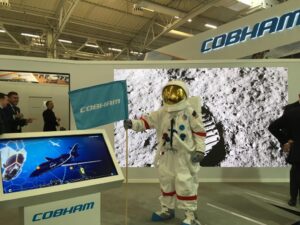Cobham, chasing megaconstellation business, plans $5 billion privatization

WASHINGTON — Cobham, a provider of satellite components and ground systems, is preparing to accept a buyout offer that would take the company private for 4 billion British pounds ($5 billion).
The British aerospace firm said July 25 that its board voted unanimously to accept an offer from Advent International Corp. for 165 pence a share. Cobham’s stock closed at 165 pence a share on the London Stock Exchange, up 35 percent on the news.
Cobham is widely known for its aviation and defense business, but is also a supplier for many satellite programs. The company provides microwave components and other spacecraft equipment, and counts SpaceX and OneWeb as customers to supply hardware for their broadband megaconstellations. It also supplies satellite terminals for connecting ships, aircraft, and land vehicles.
Cobham employs around 10,000 people, half of which are in the United States. For the acquisition to close as planned, the company needs at least 75 percent of its shareholders to approve (its largest reportedly already opposes the deal).
The buyout offer comes as Cobham says two and a half years of “turnaround” efforts are starting to bear fruit. The company reported an 11 percent increase in revenue to 1.03 billion pounds and an operating profit of 107 million pounds for the first six months of 2019.
“It’s the first period for some time that all sectors have enjoyed organic revenue growth,” David Mellors, Cobham’s chief financial officer, said during a July 25 earnings call. Mellors said Cobham’s mission systems division, which provides satellite propulsion hardware, and its Advanced Electronics Solutions division, CASE, which provides satellite waveguides and other components, were the two big contributors to that growth.
In a July 25 financial report, Cobham listed several steps it is taking to position itself to win more space business, particularly with megaconstellations. The company said it sees increased activity surrounding space microwave components for OneWeb and some development programs the European Space Agency is funding.
“With further high volume constellations expected to be launched, investment is ongoing in technologies to support this growing market,” Cobham said, listing radio-frequency microelectronics, motion control systems and power products as areas of focus. Cobham said it is also relying more heavily on 3D printing space components and preparing a new line of low-cost space products called LeanREL.
While the CASE business, which supplies microwave components for traditional satellites and new broadband constellations, saw a 9 percent increase in revenue to 324.2 million pounds, the division’s profits are not meeting Cobham’s expectations.
CASE reported a profit of 26.5 million pounds, down 15.3 percent for the six months ended June 30. Cobham said the completion of work on NASA’s Mars 2020 program last year contributed to the lower revenue, and negative exchange rates impacted profit margins.
David Lockwood, Cobham’s chief executive, said the division has several programs that were booked with unfavorable terms, or had write-downs resulting in lower profit margins.
Lockwood said CASE is about 18 months behind the rest of the company in reaching desired performance markers, partly because the division has its own board, resulting in longer decision timelines.
In its earnings report, Cobham said “poor execution and increased overhead costs” led to the division’s underperformance.
Shawn Black, the divisions’ chief operating officer, became division president July 1. He and the division’s new management team are addressing those issues, Cobham said.
“We made a number of management changes and brought in people who have a track record of winning and executing the kind of business we [desire],” Lockwood said.
Lockwood said the new CASE management formed and implemented a cost reduction plan in a “matter of months,” progressing at a clip he described as “quite new” for the division.
“There are lots of positive signs as those changes are fed down, and that drives renewed focus on cash and profit,” Lockwood said.
In addition to satellite components, CASE is a supplier for electronic warfare systems and missile guidance programs.
from SpaceNews.com https://ift.tt/2K977TZ
Comments
Post a Comment